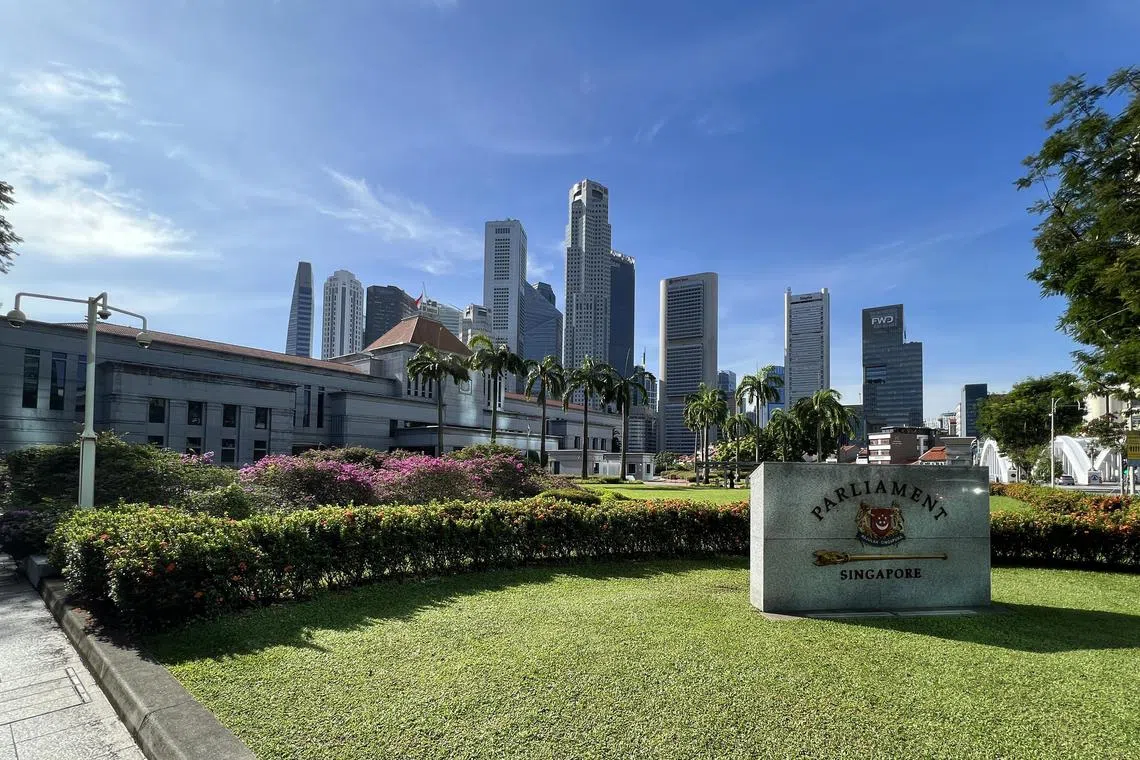Lowest number of names proposed for Nominated MP roles in two decades
Sign up now: Get ST's newsletters delivered to your inbox

There were 61 Nominated Member of Parliament submissions in 2020, compared with 30 in the latest round.
ST FILE PHOTO
SINGAPORE – Just 30 names have been put up for consideration for Nominated Member of Parliament (NMP) positions, according to a statement from the Office of the Clerk of Parliament.
This is a marked drop from previous nomination rounds, and the lowest number since the ninth Parliament was dissolved in 2001.
Nominations for this round closed at 4.30pm on Wednesday
Observers and current and former NMPs The Straits Times spoke to said the low number may be due to there being more opposition voices in Parliament – nine Workers’ Party (WP) MPs and two Non-Constituency MPs (NCMPs) from the Progress Singapore Party.
Nevertheless, they added that amid a more divisive political climate globally, NMPs can continue to provide a non-partisan perspective in Singapore.
The NMP scheme was started in 1990 to ensure a wide representation of views in Parliament. There can be up to nine NMPs during each term, which lasts 2½ years.
When the last round of nominations was called in 2020, there were 61 submissions
In the 13th Parliament, 41 names were submitted in the first session in 2016, and 48 in the second session in 2018.
There were 21 submissions for the final session of the ninth Parliament, which was dissolved in October 2001. Since that year, there had been a general upward trend in the number of submissions up till 2020, with the exception of a dip during the latter half of the 12th Parliament.
The Constitution states that those who are nominated must be “persons who have rendered distinguished public service, or who have brought honour to the Republic, or who have distinguished themselves in the fields of arts, letters, culture, the sciences, business, industry, the professions, social or community service or the labour movement”.
Besides submissions from the public, seven functional groups – business and industry; the professions; the labour movement; social service organisations; the civic and people sector; tertiary education institutions; and media, arts and sports organisations – are typically invited to submit names of suitable candidates. Each group has an appointed coordinator to seek the views of its constituent organisations.
Possible reasons for low number
Political analyst and Nanyang Technological University (NTU) associate lecturer Felix Tan cited possible reasons for the low number of submissions: fewer interested candidates, or not enough candidates with relevant credentials to be considered.
But he believes the most likely reason for the muted interest could be the wider range of voices in Parliament, especially with more opposition members now occupying seats.
The NMP scheme, mooted by then First Deputy Prime Minister Goh Chok Tong in November 1989 and introduced in 1990, was meant to evolve a more consensual style of government, where alternative views would be heard and constructive dissent accommodated.
When the scheme was being debated in Parliament in 1989, there was only one elected MP from the opposition camp – Mr Chiam See Tong from the Singapore Democratic Party – and two NCMPs from the WP.
Associate professor of law at the Singapore Management University and former NMP Eugene Tan said the relatively low number of applications this time may “well be an aberration”.
With more opposition voices in Parliament now, it may not be surprising if NMPs have been consigned to the margins of key debates or have not been able to get a foothold in the debates, he added.
“In a more contested landscape, there may be the view that non-partisan voices may not command a premium that they used to. It would not surprise me if the NMP scheme sleepwalks to irrelevance in the fullness of time,” said Prof Tan.
Today, NMPs can vote on all matters before Parliament except constitutional amendments, motions to remove the president, motions of no confidence in the government, and supply and money Bills.
Ms Anthea Ong, an NMP from 2018 to 2020, said the drop in applications may be because some Singaporeans feel the increased number of elected opposition members in this Parliament already provides the diversity of voices and ideas needed for more robust parliamentary debates in an increasingly challenging environment.
NMP Abdul Samad Abdul Wahab cited a more practical reason.
With a general election that must be called by 2025, he said, there may be a shorter term ahead for new NMPs as they may not serve the full 2½ years. They may thus not have a longer runway to put forth their ideas.
The vice-president of the National Trades Union Congress rejected the notion that NMPs have taken a back seat to more vocal opposition members. He said he has spoken up where necessary, and even corrected a fellow parliamentarian.
“There are instances where the NMPs have abstained from voting on issues, and we have raised ideas that have led to tweaks in policies,” he noted. “If it’s good for Singaporeans, why would we not support it? We don’t rebut things just for the sake of it.”
Some observers say NMPs still relevant
Ms Ong will be part of a panel discussion with other current and former NMPs on May 5 to discuss the roles NMPs play, and the low number of proposal forms received this time.
Ms Ong had edited a book of essays by current and former NMPs – titled The Nominated Member Of Parliament Scheme: Are Unelected Voices Still Necessary in Parliament? – which explored the relevance of the scheme and included NMPs’ personal reflections on their time as parliamentarians.
At the book’s launch in 2022, Emeritus Senior Minister Goh said that in the years since the scheme began, NMPs have “added colour, depth and breadth to parliamentary debates”, including by introducing Private Member’s Bills and filing motions.
A major contribution from an NMP is the Maintenance of Parents Act, introduced as a Private Member’s Bill by then NMP Walter Woon in 1994 and passed in Parliament in 1995.
Another NMP, Dr Kanwaljit Soin – the first woman NMP – put up a Family Violence Bill in 1995. Although the Bill was not supported, her proposals were included in amendments to the Women’s Charter.
Explaining why there is still a role for NMPs, Ms Ong said: “Given the partisan ills of a two-party system we see in several major democracies across the globe, if chosen well, NMPs can provide the non-partisan check to increasing political contestation in the Chamber.”
Ultimately, she said, the quality of applications and the selection process are more important than the low number of submissions.
NTU’s Dr Tan said the scheme is still relevant despite more opposition voices now.
“Their contribution to parliamentary discussion goes beyond simply scoring political points and pitting one segment against another,” he added.
“In such necessarily divisive and heated debates, NMPs can bring to the table a more balanced approach.”
Now that submissions have closed, an eight-member Special Select Committee chaired by Speaker of Parliament Tan Chuan-Jin will interview and consider the eligible candidates. It will nominate up to nine people for the president to appoint as NMPs. The current NMPs will finish their term in July.



